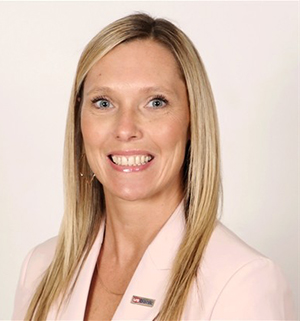
The coaches cover topics today's students are asking about the most
NORTHAMPTON, MA / ACCESSWIRE / October 10, 2024 / U.S. Bank

Holly Kierstead
Originally published on U.S. Bank company blog
While U.S. Bank has goals coaches who serve clients at all stages in life, some coaches focus on helping students at colleges and universities across the country. With the new school year getting into swing, here are tips from those coaches on dealing with the topics students raise with them the most.
Setting goals
When setting goals, it's good to start by evaluating where you currently are in life and, from there, set personal, professional and financial goals along with dates to achieve those goals, said goals coach Holly Kierstead.
"For example, if you're a freshman in college, your goals could be to learn what study habits work for me, actively meet new people and start a budget," she said. "A graduating senior's goals could be to discover myself, prepare my resume and cover letter, and grow my money."
It's important to make the goals well-defined, said goals coach Barry Saeger.
"By setting goals that are specific, measurable, attainable, relevant and time-bound, you can be more intentional with your future plans," Saeger said.
Utilizing resources
To help achieve the goals you set, it's helpful to use the tools at your disposal, Saeger said.
"Your academic counselors, financial aid advisors, even a goals coach are wanting you to succeed in achieving your academic goals," he said. "Use these resources as your accountability partners in accomplishing what you need to get done and take ownership of your future."
Some students may be hesitant to ask for help, and they need to put that hesitation aside, Kierstead said.
"Don't be afraid to ask or reach out for help and be honest," she said. "Whether it is related to class content you are not understanding, your finances or something personal that is weighing on you, speak up and reach out to someone for help."
Time management
Many things can compete for a college student's time and attention, and managing time effectively is crucial in balancing academic, social and personal responsibilities, goals coach Haitham Suleiman said.
"We start with having the client list all their tasks and deadlines, then have them prioritize them based on importance and urgency, focusing on the most critical tasks first to complete," he said. "Then they work on creating a schedule by using either a planner or digital calendar so they can map out their day, week and month to allocate specific time needed for each task."
Goals coach Timothy Klecker said that, like many people, he struggled to manage time efficiently in his early adult years.
"Recognizing that you may have issues with time management is often a symptom of a larger issues, such as procrastination, excessive distractions and possibly lack of future vision for the direction one wants their life to go," Klecker said. "Each of us has the same 24 hours in a day and what matters is what you do with that time to focus most productively toward a centralized goal."
Managing finances
Suleiman said he often works with college students to create a budget plan.
"They will list all income and expenses for a month to get a clear picture of where their money is going," he said. "Once they have a baseline, they should work on categorizing their spending into needs, like rent, grocery and utilities, and wants, like dining out, entertainment and shopping. After that, they can start allocating specific amounts of money to each category and start building a savings plan for a rainy day."
Learning to manage credit effectively is very important, Klecker said.
"As you enter the early stages of adulthood, take the time to learn the ins and outs of debt management," he said. "The temptation to buy now and pay later may feel like a relief, but over time and without the proper frame of mind, it can become all too easy to find yourself underwater just when your lives are really beginning to take off."
Saeger said it's especially important to be mindful of social spending such as eating out, having food delivered or doing activities with friends.
"Consider giving yourself a weekly allowance that can be used for experiences you enjoy, but still fits within your budget," he said. "By establishing a planned amount of dollars for entertainment, you can still have fun while not placing additional stress on your bank account."
The right mindset
Setting goals and making a plan aren't the only ingredients in achieving them, said goals coach Tamra Clark Champion.
"The single most important gift you can give yourself - past, present, and future - is a positive mindset," she said.
"For the past, consider the lessons you have gleaned from your mistakes or failures," Clark Champion said. "In the present, appreciate where you are, what you have, and all you are becoming. When you think about the future, focus more on who you want to be rather than what you want to achieve. Your life is what you make it in every moment."
View additional multimedia and more ESG storytelling from U.S. Bank on 3blmedia.com.
Contact Info:
Spokesperson: U.S. Bank
Website: https://www.3blmedia.com/profiles/us-bank
Email: info@3blmedia.com
SOURCE: U.S. Bank
View the original press release on accesswire.com

